- Home
- William Styron
Sophie's Choice Page 15
Sophie's Choice Read online
Page 15
“In the catalogue room, first door to the left,” muttered Weiss, unsmiling, then after a long pause added, “But you won’t find any such listing.”
“Won’t find any such listing?” Sophie echoed him, puzzled. Following a moment’s silence, she said, “Could you tell me why?”
“Charles Dickens is an English writer. There is no American poet by the name of Dickens.” The voice was so sharp and hostile as to be like an incision.
Swept with sudden nausea, light-headed and with a perilous tingling moving across her limbs like the faint prickling of a multitude of needles, Sophie watched with dispassionate curiosity as Sholom Weiss’s face, sullenly inflexible in its graven unpleasantness, seemed to float away ever so slightly from the neck and the confining collar. I feel so terribly sick, she said to herself as if to some invisible, solicitous doctor, but managed to choke out to the librarian, “I’m sure there is an American poet Dickens.” Thinking then that those lines, those reverberant lines with their miniature, sorrowing music of mortality and time, would be as familiar to an American librarian as anything, as household objects are, or a patriotic anthem, or one’s own flesh, Sophie felt her lips part to say, Because I could not stop for Death... She was hideously nauseated. And she failed to realize that in the intervening seconds there had registered somewhere in the precincts of Sholom Weiss’s unmagnanimous brain her stupid contradiction of him, and its insolence. Before she could utter the line, she heard his voice rise against every library decree of silence and cause a distant, shadowy turning of heads. A hoarse rasping whisper—querulous, poisoned with needless ill will—his retort was freighted with all the churlish indignation of petty power. “Listen, I told you,” the voice said, “there is no such a person! You want me to draw you a picture! I am telling you, do you hear me!”
Sholom Weiss may easily have thought that he had slain her with language. For when Sophie woke up some moments later from the dead faint into which she had slumped to the floor, his words still ricocheted crazily about in her mind and she realized dimly that she had fallen into a swoon just at the instant he had finished yelling at her. But everything now had gone topsy-turvy, disjointed, and she barely knew where she was. The library, yes, certainly, that was where she was, but she seemed to be reclining awkwardly on a sort of couch or window seat not from the desk in front of which she had collapsed, and she was so weak, and a disgusting odor flooded the air around her, a sour smell she could not identify until, slowly, feeling the wet stain down the front of her blouse, she became aware that she had thrown up her last meal. A damp carapace of vomit drenched her breast like foul mud.
But even as she absorbed this knowledge she moved her head listlessly, conscious of something else, a voice, a man’s voice, orotund, powerful, raging at the half-cowering and perspiring figure whose back was to her but whom she dimly recognized by the green eyeshade gone askew on his brow as Sholom Weiss. And something stern and commanding and consummately outraged in the voice of the man, whom she could barely see from her vantage point, caused an odd and pleasant chill to course up her back even as she reclined there in her feeble, prostrate helplessness. “I don’t know who you are, Weiss, but you’ve got bad manners. I heard every fucking word you said to her, I was standing right here!” he roared. “And I heard every intolerably rude and ugly thing you said to that girl. Couldn’t you tell she was a foreigner, you fucking little momzer you, you shmuck!” A small crowd had gathered around and Sophie saw the librarian quiver as if he were being buffeted by savage winds. “You’re a kike, Weiss, a kike, the kind of mean little creep that gives Jews a bad name. That girl, that nice and lovely girl there with a little trouble with the language, asks you a perfectly decent question and you treat her like some piece of shit walked in. I ought to break your fucking skull! You got about as much business around books as a plumber!” Suddenly, to her drowsy astonishment, Sophie saw the man yank Weiss’s eyeshade down around his windpipe, where it dangled like a useless celluloid appendage. “You nasty little putz,” the voice said, full of contempt and revulsion, “you’re enough to make anyone puke!”
Sophie must have lost consciousness once more, for the next thing she remembered was Nathan’s gentle, strong and marvelously expressive fingers streaked, to her intense discomfort, with slimy smears of her own vomit yet endlessly consoling and reassuring as they lightly applied something wet and cool to her brow. “You’re all right, honey,” he whispered, “you’re going to be all right. Just don’t worry about anything. Ah-h, you’re so beautiful, how did you get to be so beautiful? Don’t move now, you’re all right, you just had a funny little spell. Just lie still, let the doctor take care of everything. There, how does that feel? Want a little sip of water? No, no, don’t try to say anything, just relax, you’re going to be all well in just a minute.” On and on the voice went, a gentle monologue, lulling, soothing, murmurously infusing her with a sense of repose; it was a soft refrain so sedative indeed that soon she was no longer even embarrassed that the hands of this stranger were greenly stained with her own sour juices, and somehow she regretted that the one thought she had expressed to him, when she had first opened her eyes, had been the impossibly foolish Oh, I think I’m going to die. “No, you’re not going to die,” he was saying again in that voice filled with its infinite and patient strength, as the fingers brought exquisite coolness to her brow, “you’re not going to die, you’ll live to be a hundred. What’s your name, sweetie? No, don’t tell me now, just lie still and look beautiful. Your pulse is fine, steady. There, try this little sip of water...”
Chapter Five
IT MUST HAVE BEEN a couple of weeks after settling comfortably into my pink lodgings that I received another communication from my father. It was a fascinating letter in itself, although I could hardly realize then what bearing it would ultimately have upon my relationship with Sophie and Nathan and the scrambled events that took place later on in the summer. Like the last of his letters I quoted—the one about Maria Hunt—this message had to do with a death, and like the earlier one concerning Artiste, it brought me news of what might be considered something in the nature of a legacy, or a share in one. I set down most of it here:
Son, ten days ago my dear friend and political & philosophical antagonist Frank Hobbs dropped dead at his office in the shipyard. It was a swift, I should say almost instantaneous cerebral thrombosis. He was only 60, an age I have begun desperately to perceive as being virtually in life’s springtide. His passing was a great shock to me and I feel the loss deeply. His politics of course were deplorable, situating him I should say about 10 miles to the right of Mussolini, but withal he was what we who originated in the country have always termed a “good ole boy” and I shall miss intensely his hulking, generous albeit bigoted presence as we drove to work. He was in many ways a tragic man, lonely, a widower, and still mourning the death of his only child, Frank Jr., who you may remember drowned while still in his twenties not long ago in a fishing accident down on Albemarle Sound. Frank Sr. left no survivors, and that fact is central to this letter and to the reason I am writing you at some length.
Frank’s lawyer called me up several days ago to inform me, to my enormous astonishment, that I am the chief beneficiary of his estate. Frank had little money saved and no investments, having been like myself only a high class wage-earner within or perhaps I should say astride the precarious back of the monstrous leviathan known as American business. Thus I regret I do not bring you tidings of the imminent receipt of a fat check to lighten your worries as you labor in the literary vineyard. For many years, however, Frank had been the owner and absentee landlord of a small peanut farm over in Southampton County, a place that was in the Hobbs family ever since the Civil War. It is this farm that Frank left to me, stating in his will that while I could do with it what I wished it was his earnest hope that I continue to farm the place as he had done, realizing not only the very modest profit that can be gained from 60 acres of peanuts but enjoying the pleasant and verdant countrysi
de in which the farm is situated, along with a lovely little stream swarming with fish. He must have known how much I appreciated the place, which I visited a number of times over the years.
This extraordinary and touching gesture of Frank’s has, however, I’m afraid, thrown me into something of a quandary. While I should like to do anything within my power to accede to Frank’s desire and not sell the place I don’t know if I am any longer temperamentally suited to farming after these many years (although as a boy in N.C. I was well acquainted with the heft of a shovel and hoe), even as an absentee owner as Frank was. It still requires a great deal of work and attention and while Frank doted on it I have my own labor cut out for me here at the shipyard. In many ways of course it is an attractive proposition. There are two very able and reliable negro tenant farmers on the place, and the equipment is in reasonably good condition. The main dwelling itself is in excellent repair and would make a fine weekend retreat particularly considering its proximity to that wonderful fishing stream. Peanuts are now a coming money crop, especially since the late war opened up so many new uses for the legume. Frank, I remember, sold most of his crop to Planters in Suffolk, where it went to help satiate America’s ravenous need for “Skippy” peanut butter. There are some hogs, too, which of course make the finest hams in all Christendom. Also there are a few acres planted in soybeans and cotton, both still profitable crops, and so as you can see there are totally mercenary aspects of the situation—aside from the aesthetic and recreative—that tempt me into lending my hand to agrarian pursuits after 40-odd years’ absence from the barn and the field. Certainly it would not make me rich, though I suspect I might in some small way augment an income badly depleted by the needs of your poor aunts down in N.C. But I am balked by the aforementioned serious qualms and reservations. And this brings me, Stingo, to your possible or potential role in this so far unresolved dilemma.
What I am proposing is that you come down to the farm and live on it, acting as the proprietor in my absence. I can almost feel your chagrin as you read this, and see that “but I don’t know a damn thing about raising peanuts” look in your eye. I am well aware how this may not seem at all suitable to you, especially since you have chosen to cast your lot as a literary man among the Yankees. But I am asking you to consider the proposition, not because I don’t honor your need for independence as you sojourn in the (to me) barbaric North but out of honest solicitude for the discontent you express in your recent letters, that sense I get that you are not precisely flourishing, spiritually or (of course) financially. But for one thing your duties would be minimal since Hugo and Lewis, the two negroes who have been on the place for years with their families, have the practical matters of the place well in hand so that you would function as a kind of gentleman farmer whose main work, I’m certain, would be the writing of that novel you tell me you have embarked upon. But you would also pay no rent and I’m sure I could manage a small extra stipend for your few responsibilities. Furthermore (and I was saving this for now) I ask you to consider this final inducement, which is the proximity of the farm to the ancient habitat of “ole prophet Nat,” that mysterious negro who so frightened the pants off or (if you will pardon the more accurate expletive) the s—t out of an unhappy slave-holding Virginia so many years ago. No one knows better than I of your fascination with the “ole Prophet” since I cannot forget how even as a high school boy you were busy with your maps and your charts and all the meager information you were able to assemble regarding that extraordinary figure. The Hobbs farm is only a hop, skip and a jump from the ground upon which the Prophet set forth on his terrible mission of bloodshed, and I should think that if you took up residence there you might be richly supplied with all the atmosphere and information you need for that book I’m sure you will eventually write. Please think over carefully this proposition, son. Needless to say I would not nor can I disguise the element of self-interest that prompts the offer. I am very much in need of an overseer for the farm, if I am to keep it at all. But if this is true I cannot disguise, either, the vicarious pleasure I take in thinking that you, growing to be the writer I yearned to be but could not, might have such a splendid chance to live on that land, to feel and see and smell the very earth which gave birth to that dim and prodigious black man...
In a way it was all very tempting, and I could not deny it. With his letter my father had enclosed several Kodachrome snapshots of the farm; surrounded and shaded by lofty beech trees, the sprawling old mid-nineteenth-century farmhouse looked as if it needed—aside from a coat of paint—hardly anything to make it the comfortable abode of one who might slide easily into that great Southern tradition of writer-farmers. The sorghum-sweet serenity of the place (geese paddling through the weedy summer grass, a drowsy porch with a swing, old Hugo or Lewis sending a grin full of calcimine teeth and pink gums across the steering wheel of a muddy tractor) skewered me squarely for an instant on a knifeblade of nostalgia for the rural South. The temptation was both poignant and powerful, and it lasted for as long as it took me to read the letter twice more and to brood over the house and its homely lawn again, all of it seemingly suspended in a milky idyllic mist, which may, however, have been the result of the film’s overexposure. But though the letter tugged at my heart and at the same time possessed, in practical terms, a compelling logic, I realized that I had to turn my father’s invitation down. If the letter had arrived only a few weeks before, at the low ebb of my life after being fired from McGraw-Hill, I might have jumped at the chance. But things were now radically altered and I had happily come to terms with my environment. So I was forced to write back to my father a somewhat regretful No. And as I look back now on that promising time I realize that there were three factors responsible for my surprising newborn contentment. In no particular order of significance, these were: (1) sudden illumination about my novel, its prognosis heretofore opaque and unyielding; (2) my discovery of Sophie and Nathan; and (3) anticipation of guaranteed sexual fulfillment, for the first time in my unfulfilled life.
To begin with, a word about that book I was trying to get started on. In my career as a writer I have always been attracted to morbid themes—suicide, rape, murder, military life, marriage, slavery. Even at that early time I knew my first work would be flavored by a certain morbidity—I had the feeling in my bones, it may possibly be called the “tragic sense”—but to be perfectly honest, I had only the vaguest notion of what I was so feverishly setting off to write about. It is true that I possessed in my brain a most valuable component of a work of fiction: a place. The sights, sounds, smells, the lights and shades and watery deeps and shallows of my native Tidewater coast were urgently pressing me to be given physical reality on paper, and I could scarcely contain my passion—it was almost like a rage—to get them down. But of characters and story, a sensible narrative through which I might be able to thread these vivid images of my recent past, I had none. At twenty-two I felt myself to be hardly more than a skinny, six-foot-tall, one-hundred-and-fifty-pound exposed nerve with nothing very much to say. My original strategy was pathetically derivative, lacking logic and design and substituting for both an amorphous hunger to do for a small Southern city what James Joyce had done in his miraculous microcosm. For someone of my age it was not a totally worthless ambition, save for the fact that even on the more modest level of attainment I sought, there seemed no way to invent Dixieland replicas of Stephen Dedalus and the imperishable Blooms.
But then—and oh, how true it is that most writers become sooner or later the exploiters of the tragedies of others—came (or went) Maria Hunt. She had died just at that moment when I most needed that wondrous psychic jolt known as inspiration. And so during the next few days after getting news of her death, as the shock wore off and I was able to adopt what might be called a professional view of her grotesque ending, I was overtaken by a fabulous sense of discovery. Again and again I pored over the newspaper clipping my father had sent, becoming warm with excitement as the awareness grew that Maria and her fa
mily might serve as the exemplary figures for the novel’s cast of characters. The rather desperate wreck of a father, a chronic lush and also something of a womanizer; the mother, slightly unbalanced and a grim pietist, known throughout the upper-middle-class, country-club and high Episcopal echelons of the city for her long-suffering tolerance of her husband’s mistress, herself a social-climbing dimwit from the sticks; and the daughter finally, poor dead Maria, doomed and a victim from the outset through all the tangled misunderstandings, petty hatreds and vindictive hurts that are capable of making bourgeois family life the closest thing to hell on earth—my God, I thought, it was perfectly marvelous, a gift from the sky! And I realized to my delight that, however unwittingly, I had already put together the first part of the frame to surround this tragic landscape: my dog-eared train ride, the passage I had cherished and reread with such daft absorption, would now represent the arrival in the town of our heroine’s body, disinterred from the potter’s field in New York and shipped in a baggage car for final burial in the city of her birth. It seemed too good to be true. Oh, what ghoulish opportunism are writers prone to!

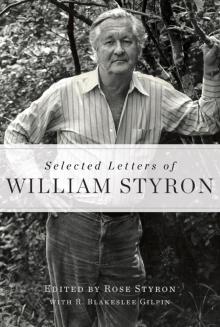 Selected Letters of William Styron
Selected Letters of William Styron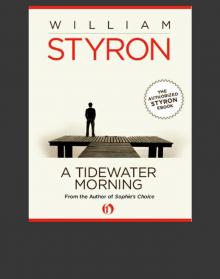 A Tidewater Morning
A Tidewater Morning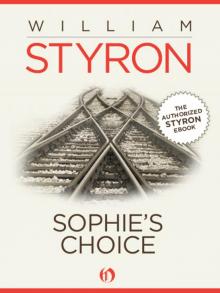 Sophie's Choice
Sophie's Choice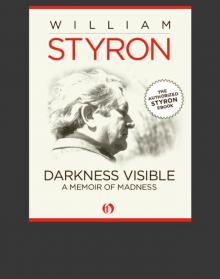 Darkness Visible: A Memoir of Madness
Darkness Visible: A Memoir of Madness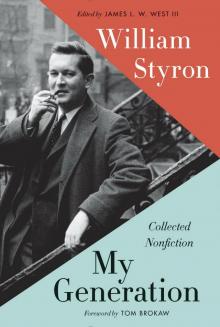 My Generation: Collected Nonfiction
My Generation: Collected Nonfiction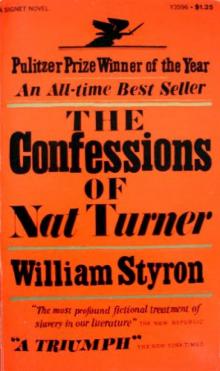 The Confessions of Nat Turner
The Confessions of Nat Turner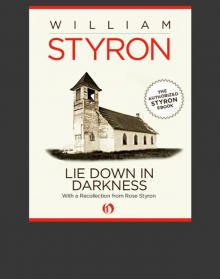 Lie Down in Darkness
Lie Down in Darkness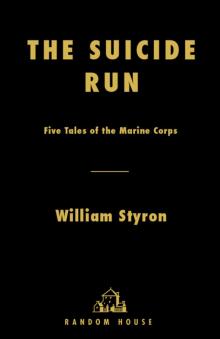 The Suicide Run: Five Tales of the Marine Corps
The Suicide Run: Five Tales of the Marine Corps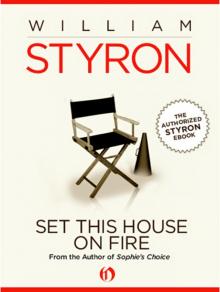 Set This House on Fire
Set This House on Fire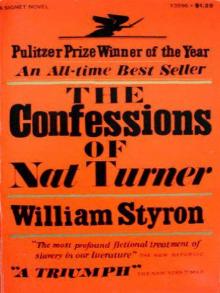 Confessions of Nat Turner
Confessions of Nat Turner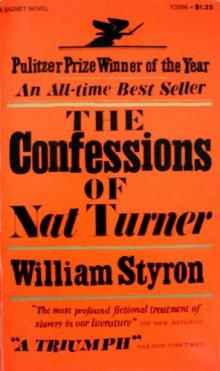 The Confessions of Nat Turner (1968 Pulitzer Prize)
The Confessions of Nat Turner (1968 Pulitzer Prize)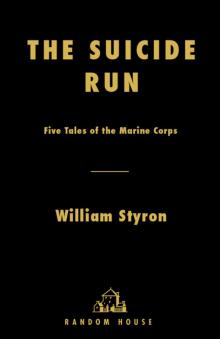 The Suicide Run
The Suicide Run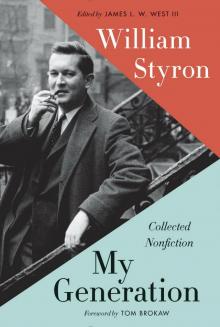 My Generation
My Generation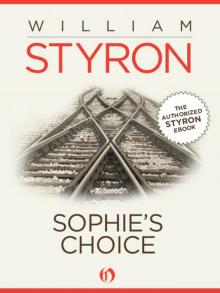 Sophie's Choice (Open Road)
Sophie's Choice (Open Road)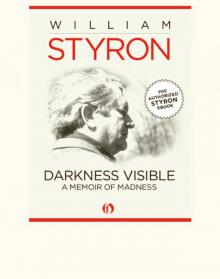 Darkness Visible
Darkness Visible